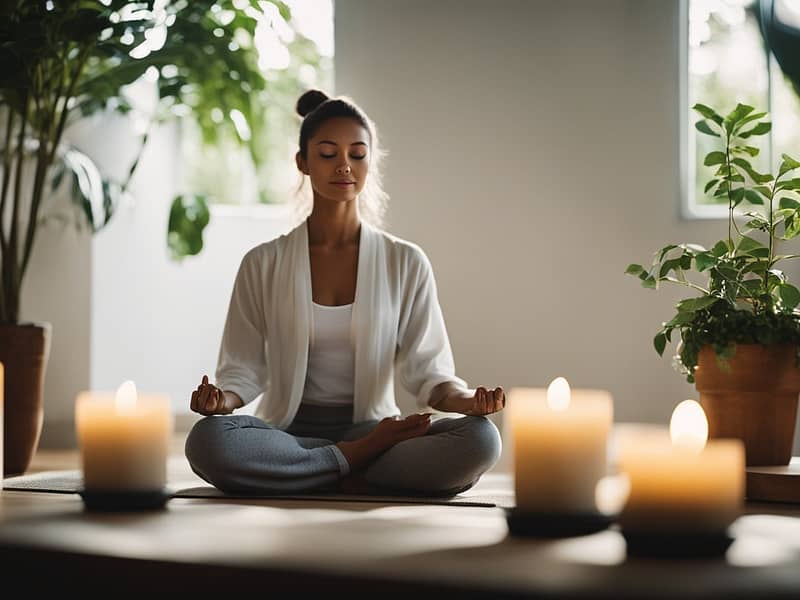Creating a self-care routine is an essential part of maintaining your physical, mental, and emotional well-being. It involves taking deliberate actions to care for yourself and prioritize your needs. With the daily stresses of life, it’s easy to forget to take care of yourself, but neglecting self-care can lead to burnout, anxiety, and other health issues.
Understanding self-care is the first step in developing a self-care routine. Self-care is any activity that you do deliberately to take care of your mental, emotional, and physical health. It’s not selfish or indulgent, but rather a necessary part of maintaining a healthy lifestyle. Developing a self-care routine involves identifying the activities that work best for you and incorporating them into your daily life. In this article, we will explore various self-care tips to help you create a self-care routine that works for you.
Key Takeaways
- Understanding self-care is essential for developing a self-care routine.
- Creating a self-care routine involves identifying the activities that work best for you and incorporating them into your daily life.
- Self-care is not selfish or indulgent, but rather a necessary part of maintaining a healthy lifestyle.
Understanding Self-Care
Self-care is the practice of taking care of oneself, both physically and mentally. It is a crucial aspect of maintaining overall health and well-being. Understanding self-care involves defining it and exploring its benefits.
Defining Self-Care
Self-care encompasses a wide range of activities that promote physical, emotional, and mental health. It involves taking responsibility for one’s own well-being and making choices that support overall health. Self-care can include activities such as exercise, meditation, healthy eating, getting enough sleep, and engaging in hobbies or activities that bring joy.
Benefits of Self-Care
Self-care has numerous benefits for overall health and well-being. It can help reduce stress, improve mood, increase energy levels, and enhance physical health. Regular self-care can also prevent burnout and improve one’s ability to cope with life’s challenges.
Taking care of oneself is especially important for those who struggle with mental health issues, such as anxiety or depression. Practicing self-care can help manage symptoms and improve overall mental health.
In conclusion, understanding self-care is essential for maintaining overall health and well-being. By defining self-care and exploring its benefits, you can begin to develop a self-care routine that works for you. Incorporating self-care into your daily life can have a significant positive impact on your physical, emotional, and mental health.
Developing a Self-Care Routine
Creating a self-care routine is essential to maintain your physical, emotional, and mental well-being. Developing a self-care routine may seem overwhelming at first, but with proper planning and dedication, it can become a sustainable habit.
Assessing Your Needs
The first step in developing a self-care routine is to assess your needs. Take some time to reflect on your daily routine and identify areas where you feel stressed, anxious, or overwhelmed. Make a list of activities that make you feel relaxed, happy, and fulfilled. This list will help you identify your specific needs and create a self-care routine that works for you.
Setting Self-Care Goals
Setting self-care goals is an essential part of developing a self-care routine. Start by setting realistic and achievable goals that align with your specific needs. Your goals can be as simple as taking a 10-minute walk every day or spending 30 minutes reading a book before bed. Make sure to schedule your self-care activities and set reminders to help you stay on track.
Incorporating Self-Care into Daily Life
Incorporating self-care into your daily life is crucial to creating a sustainable self-care routine. Start by integrating your self-care activities into your daily routine. For example, if you enjoy yoga, try practicing it every morning before work. If you enjoy cooking, try preparing healthy meals for yourself every day. Remember to prioritize your self-care activities and make them a non-negotiable part of your daily routine.
In conclusion, developing a self-care routine takes time and effort, but it is worth it. By assessing your needs, setting self-care goals, and incorporating self-care into your daily life, you can create a sustainable self-care routine that works for you. Remember to be patient and kind to yourself as you embark on this journey towards better self-care.
Physical and Nutritional Care
Taking care of your physical health is an essential part of self-care. In addition to exercise and physical activity, your diet and hydration are also critical components of your overall wellness. Here are some tips to help you create a self-care routine that focuses on physical and nutritional care.
Exercise and Physical Activity
Regular exercise and physical activity are important for maintaining a healthy body, reducing stress, and improving your overall mood. You don’t have to spend hours at the gym to reap the benefits of exercise. Even small amounts of physical activity can make a big difference in your health and well-being.
Here are some tips to help you incorporate exercise and physical activity into your self-care routine:
- Start small: Begin with short walks or light stretching and gradually increase the intensity and duration of your workouts as you become more comfortable.
- Find an activity you enjoy: Whether it’s hiking, dancing, or swimming, find an activity that you love and make it a regular part of your routine.
- Make it a social activity: Exercise with a friend or join a fitness class to make your workouts more enjoyable and hold yourself accountable.
Diet and Hydration
Your diet and hydration also play a significant role in your physical health. Eating a balanced diet that includes plenty of fruits, vegetables, lean proteins, and whole grains can help you maintain a healthy weight, boost your energy levels, and reduce your risk of chronic diseases.
Here are some tips to help you improve your diet and hydration:
- Drink plenty of water: Staying hydrated is essential for maintaining your energy levels, flushing toxins out of your body, and keeping your skin looking healthy.
- Eat a variety of foods: Make sure your diet includes a variety of fruits, vegetables, whole grains, and lean proteins to ensure that you’re getting all the nutrients your body needs.
- Practice mindful eating: Take the time to savor your food and pay attention to your hunger and fullness cues to avoid overeating.
By incorporating these physical and nutritional care tips into your self-care routine, you can improve your overall health and well-being. Remember to start small and be consistent, and you’ll soon see the benefits of prioritizing your physical health.
Mental and Emotional Well-being
Taking care of your mental and emotional well-being is an important part of your self-care routine. Here are some tips to help you manage stress and anxiety, and promote mindfulness and relaxation.
Stress and Anxiety Management
Stress and anxiety can have a negative impact on your mental and physical health. To manage stress and anxiety, consider the following:
- Identify the source of your stress and anxiety. This can help you come up with a plan to address it.
- Practice relaxation techniques such as deep breathing, progressive muscle relaxation, or visualization.
- Exercise regularly to release tension and improve your mood.
- Make time for activities you enjoy, such as reading, listening to music, or spending time with loved ones.
- Seek support from friends, family, or a mental health professional if needed.
Mindfulness and Relaxation
Mindfulness and relaxation techniques can help you stay present and calm in the moment. Consider the following:
- Practice meditation or yoga to promote relaxation and mindfulness.
- Cultivate gratitude by reflecting on the things you are thankful for.
- Keep a journal to help process your thoughts and emotions.
- Practice awareness by paying attention to your thoughts and feelings without judgment.
- Shift your perspective by reframing negative thoughts and focusing on the positive aspects of a situation.
By incorporating these mental and emotional self-care tips into your routine, you can promote overall well-being and improve your quality of life.
Social and Lifestyle Balance
Maintaining social and lifestyle balance is an essential part of self-care. It involves creating time for friends and activities, managing your work-life balance, and setting boundaries to ensure that you have enough time for yourself.
Creating Time for Friends and Activities
Spending time with friends and engaging in activities can help you relax and recharge. Make sure to schedule regular meetups with your friends and participate in activities that you enjoy. Whether it’s going for a hike, attending a concert, or trying a new restaurant, make time for fun and socialization.
Managing Work-Life Balance
Balancing work and personal life can be challenging. However, it is crucial to maintain a healthy work-life balance to avoid burnout and stress. Set realistic goals and prioritize your tasks to ensure that you have enough time for both work and personal life. Learn to say no to requests that can interfere with your work-life balance and make sure to take breaks and vacations to recharge your batteries.
Maintaining social and lifestyle balance is crucial for your emotional well-being. By creating time for friends and activities and managing your work-life balance, you can reduce stress and improve your overall quality of life. Remember to set boundaries and say no when necessary to ensure that you have enough time for yourself.
Advanced Self-Care Practices
If you’re looking to take your self-care routine to the next level, consider implementing some advanced self-care practices. These practices can help you improve your mental, emotional, and physical well-being. Here are some options to consider:
Seeking Professional Guidance
Sometimes, the best way to take care of yourself is to seek professional guidance. A therapist or coach can help you work through any challenges or issues you’re facing, and provide you with the support and tools you need to improve your overall well-being.
If you’re dealing with physical tension or pain, consider getting a massage. A skilled massage therapist can help release tension in your muscles and promote relaxation.
Alternative Self-Care Methods
In addition to seeking professional guidance, there are also alternative self-care methods you can try. Yoga and meditation are both great ways to promote relaxation and reduce stress. Compassion meditation, in particular, can help you cultivate feelings of kindness and compassion towards yourself and others.
There are also many other alternative self-care methods to consider, such as acupuncture, aromatherapy, and energy healing. Keep in mind that not all methods may work for you, so it’s important to experiment and find what works best for your unique needs.
Remember, taking care of yourself is an ongoing process. By incorporating advanced self-care practices into your routine, you can continue to improve your well-being and lead a happier, healthier life.
Frequently Asked Questions
What are the essential elements to include in a daily self-care routine?
A daily self-care routine should include activities that promote physical, mental, and emotional well-being. Some essential elements to include are exercise, healthy eating, hydration, sleep, meditation or mindfulness practices, and time for relaxation or hobbies.
How can students develop a self-care routine that accommodates their academic schedule?
Students can develop a self-care routine by setting aside specific times for self-care activities and prioritizing them in their schedule. They can also incorporate self-care practices that can be done in short periods of time, such as stretching or deep breathing exercises, to fit into their busy academic schedule.
What are some self-care practices specifically beneficial for women?
Self-care practices that are specifically beneficial for women include activities that promote hormonal balance, such as regular exercise and a balanced diet. Other practices include skincare routines, regular gynecological check-ups, and connecting with other women in supportive communities.
Can you suggest a self-care schedule that can be adapted to various lifestyles?
A self-care schedule can be adapted to various lifestyles by incorporating activities that fit into individual schedules and preferences. Some examples of activities that can be included in a self-care schedule are morning or evening routines, breaks throughout the day for stretching or deep breathing exercises, and scheduling time for hobbies or relaxation.
Why is it important to prioritize self-care, and what are its benefits?
Prioritizing self-care is important because it promotes overall well-being and reduces stress. Self-care can also improve physical health, mental health, and relationships with others. Benefits of self-care include increased energy, improved mood, better sleep, and a strengthened immune system.
What strategies can help ensure a self-care routine is maintained over the long term?
Strategies that can help ensure a self-care routine is maintained over the long term include setting achievable goals, tracking progress, and making adjustments as needed. It is also important to prioritize self-care activities and make them a non-negotiable part of daily life. Building a supportive community and seeking professional help when needed can also help maintain a self-care routine over the long term.






